Stuart Aken's Blog, page 288
September 26, 2011
Stuart's Daily Word Spot: Fabulous
 Image via Wikipedia
Image via WikipediaFabulous: adjective - of the nature of a fable;full of fables; unhistorical; known via fable; like a fable, absurd; found onlyin fable; astonishing; excellent, marvellous or terrific; of alleged existencesor facts - belonging to fable, legendary; of doctrines or ideas - based on fable; celebrated through fable.
'The Beatles were referredto as the Fab Four in their early days as a supergroup; their rise to fame andfortune as fabulous as any myth or fairy tale you care to name.'
'Polly sauntered along thebeach in her almost bikini, male eyes admiring her fabulous looks as shepassed.'

Published on September 26, 2011 06:00
September 25, 2011
Stuart's Daily Word Spot: Stationary or stationery?
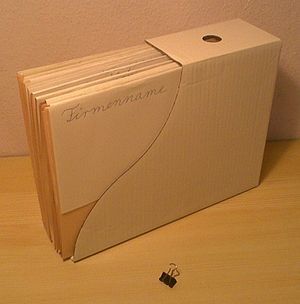 Image via Wikipedia
Image via WikipediaStationary or stationery?
This is a very old dilemma with a particularly simple solution.
Since 'stationery' is the stuff you use for writing etc, you only needremember that 'stationery' with an 'e' includes envelopes.
On the other hand, 'stationary' means to remain still so just rememberthat if you halt, you'll be 'stationary.'
There, that was easy, wasn't it?

Published on September 25, 2011 06:00
September 24, 2011
Stuart's Daily Word Spot: Earnest
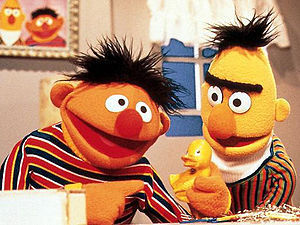 Image via Wikipedia
Image via WikipediaEarnest: adjective – with serious intent, nottrifling, ardent, intense, zealous; as a result of or a display of sincereconviction; weighty or important.
'Colin was so earnest inhis pursuit of philately that one would think his life depended on his searchfor new stamps.'
24 September 1936 JimHenson, the creator of the Muppets, was born – and one of his characters was,of course, called 'Earnie', a diminutive of 'Earnest'.

Published on September 24, 2011 06:00
September 23, 2011
Stuart's Daily Word Spot: Ebisu
 Image via Wikipedia
Image via WikipediaEbisu: this is another ofmy occasional reminders that there are many different gods worshipped on thisstrange but wonderful planet we inhabit. Ebisu is a Japanese god in the Shintotradition. A fat and smiling deity with a beard, he is generally depicted witha fishing rod in one hand and sea bream in the other. He's considered a god ofluck and has been worshipped since ancient times, especially by fishermen. Morerecently, he's become associated with profit and his picture adorns the manycommercial premises. Because he's deaf, apparently, he doesn't join the rest ofthe gods for the October festival held at Izumo, which seems to be anotherinstance of the peculiar prejudices surrounding so many religious figures.

Published on September 23, 2011 06:00
Daily Cheap Reads
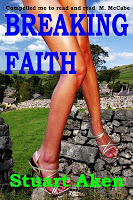 This is a website that selects and promotes good books selling at reasonable prices. If you're looking for a good read that won't cost you a fortune, this is the place to look. This week, they featured Breaking Faith. The link to the site is here: http://dailycheapreads.co.uk/page/2/
This is a website that selects and promotes good books selling at reasonable prices. If you're looking for a good read that won't cost you a fortune, this is the place to look. This week, they featured Breaking Faith. The link to the site is here: http://dailycheapreads.co.uk/page/2/
Published on September 23, 2011 03:19
September 22, 2011
Author Interview with Sandra McLeod Humphrey
 SandraMcLeod Humphrey is a retired clinical psychologist, a character educationconsultant, and an award-winning author of seven middle-grade and young adultbooks. She's also the recipient of the National Character Education Center'sAward for Exemplary Leadership in Ethics Education (2000) and the 2005 HelenKeating Ott Award for Outstanding Contribution to Children's Literature. In herwords: "After working as a clinical psychologist for more than 31 years, Iconsider my new writing career as the 'desssert' of my life!"
SandraMcLeod Humphrey is a retired clinical psychologist, a character educationconsultant, and an award-winning author of seven middle-grade and young adultbooks. She's also the recipient of the National Character Education Center'sAward for Exemplary Leadership in Ethics Education (2000) and the 2005 HelenKeating Ott Award for Outstanding Contribution to Children's Literature. In herwords: "After working as a clinical psychologist for more than 31 years, Iconsider my new writing career as the 'desssert' of my life!"Your latest book is Hot Issues, CoolChoices: Facing Bullies, Peer Pressure, Popularity, and Put-Downs;perhaps you'd you give us some insight into it in a few sentences and let usknow how you came to write it?
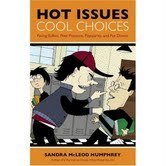 HotIssues, Cool Choices: Facing Bullies, Peer Pressure, Popularity, and Put-Downs was a book I had to write. After doing school visitsfor two years and hearing the personal stories the students told me about theirbullying experiences, I knew I had to share those stories with my readers. Thestories are fictionalized to some extent, but they are all based on truebullying experiences, and the book is dedicated to a 12-year-old boy who tookhis own life as a result of being bullied.
HotIssues, Cool Choices: Facing Bullies, Peer Pressure, Popularity, and Put-Downs was a book I had to write. After doing school visitsfor two years and hearing the personal stories the students told me about theirbullying experiences, I knew I had to share those stories with my readers. Thestories are fictionalized to some extent, but they are all based on truebullying experiences, and the book is dedicated to a 12-year-old boy who tookhis own life as a result of being bullied.Do you have afavourite character from the book? If so, who and why this particular one?
Oneof my favorite stories from the book is the one written by a bully himself whois totally clueless as to how others perceive him. He does not see himself as abully and uses all kinds of rationalizations to excuse his bullying behavior.
Where can people buyyour books?
Mybooks are available at all major bookstores, both offline and online, and ifpeople would like an autographed copy of one of my books, they can order onefrom my website http://www.kidscandoit.com.
What qualities does awriter need to be successful?
Fora writer to be successful, one most definitely needs perseverance and a passionto write. It has been said that a writer can not "not write" and I totallyagree. Everywhere I go and with everything I see, I think in terms of "story."What kind of story is told here and by whom? Even when I'm sitting in thewaiting room at a doctor's office, I sometimes entertain myself by making up astory about each of the other people in the waiting room.
What's your workingmethod?
Myworking method is actually pretty simple. I'm a morning person, so I write inthe mornings and do my busywork in the afternoons or evenings when I'm prettymuch "brain-dead." I usually set a potentially attainable goal each day (onpaper), so that at the end of the day, I can cross it off. I'm a "list person"and I love to make lists, just so I can cross everything off at the end of theday!
What's the singlebiggest mistake made by beginner writers?
Ithink one of the mistakes beginning writers may make is to not read enough. Tobe a writer, one must READ, READ, READ, particularly in their genre. Anothercommon mistake is insufficient market research before they send theirmanuscripts off to the publishers. There are some great marketing resourcesavailable, and the editors will know if you've done your homework.
To what extent aregrammar and spelling important in writing?
Imay be in the minority, but personally, I think grammar and spelling areextremely important. They show that "you care enough to send the very best!"
How much do yourevise your MS before sending it off?
Irevise and revise and then I revise some more. I also give my manuscripts a"cooling off" period of a few days (or weeks), so that I can look at them withfresh eyes the way a potential reader would be looking at them.
As a writer, to whatextent do you think genre is useful in the publishing world?
Actually,I think genre is quite important—particularly when it comes to differentiatingM-G novels from YA novels and from differentiating the various types of fantasyand sci-fi novels.
Many authors seemarketing as a bind. What's your opinion on this, and how do you deal with it?
I'mnot sure what you mean by "bind," but I see marketing simply as one of those thingsI have to do as a writer. This means checking out potential prepublicationendorsers, potential reviewers, appropriate book awards, etc. There are alwaysmarketing "surprises" one never anticipates such as the Boston middle schoolwhich ordered 900 copies of one of my books to use in their pen pal programwith their community leaders. Who could ever have predicted that one?
What sort ofdisplacement activities keep you from writing?
Iactually do a lot of work with our youth as a Sunday school teacher, VacationBible School teacher, confirmation mentor, school visits, young writers'workshops, etc., but there's most definitely an upside to all my youthactivities because the time I spend with our youth gives me great material formy books.
What support, if any,do you receive from family and friends, writing group, or dedicatedprofessionals?
EverywhereI go, I get support! My social networking friends on the internet, my friendsin the real world, and especially my husband (who never complains about theendless hours I spend on the computer) all give me very much appreciatedsupport!
Is presentation ofthe MS as important as agents and publishers suggest?
Ithink presentation is extremely important! That first line, that firstparagraph, that first page all make an impression! Your format, your grammar,your spelling, your typos, your "voice," your writing style, your storyline,your characterization etc. will all be revealed by the end of the firstchapter.
How long does it takeyou to write a book?
I'musually working on two books simultaneously, and it generally takes me abouttwo years to complete both books.
Who or what inspiresyour writing?
Peopleand social issues inspire my writing. The problem of school bullying inspiredmy bullying book, the questions my confirmation students asked inspired my Keepin' It Real: A Young Teen Talks with God,my Sunday school classes inspired my Me,Myself, and I: Youth Meditations for Grades Five through Eight, mythirty-one years as a clinical psychologist inspired my What Would You Do? series and my new book The No-Name Club's Not-So-Official Guide to Solving Your Problems(Royal Fireworks 11/11), and my ongoing passion to encourage our youth tobelieve in themselves inspired my Dare toDream!: 25 Extraordinary Lives and my new book They Stood Alone!: 25 Men and Women Who Made a Difference(Prometheus Books 11/11).
If there's a singleaspect of writing you find frustrating, what is it?
The only area of writing Ifind frustrating is that I have so many ideas for so many books I want towrite, and I know that I won't be around long enough to write them all!
Is there a particularfeature of writing that you really enjoy?
My passion is to inspireour youth to develop strong character, to believe in themselves, and to dreamdreams (their own dreams), and every time I receive letters or e-mails from myreaders who tell me how much one of my books has helped them, that is mostdefinitely a "peak experience" for me.
Do you believecreative writing is a natural gift or an acquired skill?
I think creative writingis a combination of both native ability and acquired skill. To be a successfulwriter, I think you need both.
What are you writingnow?
I'm currently working on Failure Isn't Final!: 25 Men and Women WhoNever Gave Up, and as with all my other books, I'm writing it to inspireour youth to persevere, to believe in themselves and their dreams, and to nevergive up!
Do you have a websiteor blog where readers can visit?
Youcan learn more about my books by visiting my Web site at www.kidscandoit.com. and my blog at http://www.kidscandoit.com/blog/
Given unlimitedresources, where would you do your writing?
IfI had unlimited resources, I think I'd have a beach hideaway on some Hawaiianisland with my four dogs (350 pounds of "dog") and enough electricity for mycomputer and my printer. (My husband can come, too).
Where do you actuallywrite?
I write at my computer inmy study. Actually, it's my husband's study because his study has better lightthan mine, and every time he comes in or goes out, I have to stop typing andmove my chair because my chair blocks the doorway. I'm thinking that Hawaiianisland is looking better all the time!

Published on September 22, 2011 00:30
September 21, 2011
Stuart's Daily Word Spot: Since or because?
 Image via Wikipedia
Image via WikipediaSince or because? Since: adverb – then, immediately after; from the specified time until now; at a timebetween that time and now or that time and the time under consideration; ago, before:conjunction - from the time that; duringor in the time subsequent; from the time in the past when; up to the presenttime or the time being considered from the time in the past; the time when;when; because, seeing that.
Because: adverb - for thereason that; by reason of, on account of: conjunction- for the reason that, inasmuch as, since; can also be used elliptically inanswer to a question, implying that a full response has been withheld; in orderthat, with the purpose that.
Whilst these terms can be and, indeed,often are used as if interchangeable, in writing it's probably best to stick to'since' only when referring to time and to use 'because' to establishcausality. When 'since' is used to suggest cause it may make your reader tostop to consider its meaning. Such pause for thought is not often somethingyou'd want to encourage.
'Because Frances wanted thecompany of more than one animal in her home, she filled the place with cats,dogs, rabbits and even a rather ancient and mangy donkey she'd discoveredwandering the streets.'
'Since Sandra stopped shoppingsequentially, she sought some significant substitute.' This is poor, as the reader doesn't knowwhether the cessation of shopping was responsible for Sandra's search orwhether she merely decided to seek something different once she'd finished hershopping.
'Because Sandra stopped….' Is amuch clearer way of stating the former, I think; though it lacks thealliteration, of course.
'Since mankind wandered out ofAfrica and set up shop over the various continents of the world, the search forcommodities to buy has grown continuously.' Here, it's clear that we're referring to the passage of time between theexodus and the present day.

Published on September 21, 2011 22:30
September 20, 2011
Stuart's Daily Word Spot: Deism
 Deism: noun - a doctrine or belief employed by deists; a belief in acreator God who doesn't intervene in the universe; natural religion.
Deism: noun - a doctrine or belief employed by deists; a belief in acreator God who doesn't intervene in the universe; natural religion.'As an adherent of deism,Ruth considered the world a place of wondrous divine creation in which her fatewas neither predetermined nor governed in any other way by her God.'
Pic: A summer sky.
Published on September 20, 2011 22:30
September 19, 2011
Stuart's Daily Word Spot: Sensual or sensuous?
 Image via Wikipedia
Image via WikipediaSensual or sensuous? Sensual: adjective- concerning the senses or sensation, sensory; depending only on the senses andnot the spirit or intellect; appealing to or involving appetites or desires;carnal, fleshly, lewd, depraved; immersed in material or temporal mattersrather than intellectual and spiritual interests; worldly; excessively devotedto physical pleasure or gratification of the senses; self-indulgent sexually, orwith food and drink.
Sensuous: adjective- concerning the senses or sensation; derived from or affecting the senses; affectingthe senses aesthetically rather than sensually; readily affected by the senses,keenly responsive to the pleasures of sensation.
Traditionally, the distinction between 'sensuous'and 'sensual' makes 'sensuous' a more neutral term with the meaning of 'concerningthe senses rather than the intellect', while 'sensual' relates to gratificationof the senses, especially those of a sexual nature.
Although the words, like so many of thesedifficult pairings, are more or less interchangeable, general usage suggeststhat 'sensual' be used for sexual or erotic matters, and 'sensuous' be employedmore neutrally for those things that provide pleasurable sensations of a moregeneral sort.
'Eileen, a sensual creature,who loved the feel of other skin on her own, was always seeking a mate withwhom she could experience all the wonders of sex.'
'George blamed the size ofhis belly and the girth of his waist entirely on the sensuous pleasures ofeating foods that filled his palate with delight and treated his mouth to manyvaried textures and tastes.'

Published on September 19, 2011 22:00
Mementoes of Mai, by Helmy Kusuma, Reviewed.
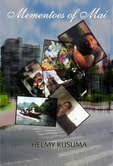 Written by a writer for whom English is not hisfirst language, this novelette reads rather like a piece of autobiography.Although Helmy is writing in a language which is not his native tongue, he hasa better grasp of idiom, grammar, spelling and sentence structure than a lot ofindie authors who claim English as their mother tongue. That's not to say thereare no errors; there are slips in tense, structure and word order. There areoccasional odd characters (textual rather than fictional) scattered amongst thewords, suggesting that the conversion from a PC document to the format neededfor an ebook has not been totally successful. But I'm nit-picking. The storyhas a charm and innocence about it that drove me to finish the book in spite ofits slight deficiencies. It is a coming of age tale, a story of personalenlightenment and epiphany. Some of the language borders on the poetic andHelmy paints word pictures that are both evocative and instructive. I feel I nowknow a great deal more about his homeland and those places he visits in the pursuanceof his dream, and, more importantly, my wish to visit these places has grownstronger.The philosophical asides chime well with thenarrative and rarely come across as author intrusion, since they seem to comenaturally from the mouth of the viewpoint narrator. I enjoyed this story. It is a good book in searchof an English speaking editor to make it into a very good book. But, even as itstands, I can recommend it as a gentle and feelgood read.
Written by a writer for whom English is not hisfirst language, this novelette reads rather like a piece of autobiography.Although Helmy is writing in a language which is not his native tongue, he hasa better grasp of idiom, grammar, spelling and sentence structure than a lot ofindie authors who claim English as their mother tongue. That's not to say thereare no errors; there are slips in tense, structure and word order. There areoccasional odd characters (textual rather than fictional) scattered amongst thewords, suggesting that the conversion from a PC document to the format neededfor an ebook has not been totally successful. But I'm nit-picking. The storyhas a charm and innocence about it that drove me to finish the book in spite ofits slight deficiencies. It is a coming of age tale, a story of personalenlightenment and epiphany. Some of the language borders on the poetic andHelmy paints word pictures that are both evocative and instructive. I feel I nowknow a great deal more about his homeland and those places he visits in the pursuanceof his dream, and, more importantly, my wish to visit these places has grownstronger.The philosophical asides chime well with thenarrative and rarely come across as author intrusion, since they seem to comenaturally from the mouth of the viewpoint narrator. I enjoyed this story. It is a good book in searchof an English speaking editor to make it into a very good book. But, even as itstands, I can recommend it as a gentle and feelgood read.
Published on September 19, 2011 11:20



